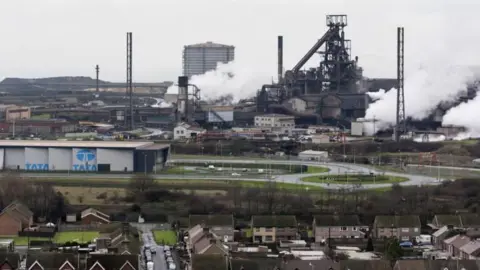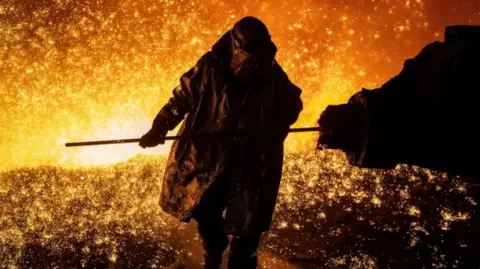Steel nationalisation talks unfair on Wales, says Plaid
 Getty Images
Getty ImagesPlaid Cymru has accused the UK government of not fighting equally for Welsh communities after it revealed it was considering nationalising British Steel.
The party has stepped up its call for nationalisation of the Port Talbot steel plant, after Chancellor Rachel Reeves put the option on the table for British Steel's Scunthorpe site.
"If it's good enough for Scunthorpe, why wasn't it good enough for Port Talbot?" said Plaid's economy spokesman, Luke Fletcher MS.
Tata Steel's blast furnaces at Port Talbot were closed six months ago, with 2,800 jobs lost, after an agreement with the UK government was reached which saw it commit £500m to help the company move to greener forms of steelmaking.
"We were asking for nationalisation to be considered until we were blue in the face," Fletcher, who also represents south-west Wales, told BBC Radio Wales Drive.
He added Plaid was told a Labour government in both Cardiff and Westminster would save Welsh steel but claimed that, following the general election, "Labour got in and the deal they put on the table was not that different to the deal the Conservatives put on the table".
In 2016, the then-Conservative UK government ruled out nationalisation, and the £500m deal agreed between Tata and the new Labour government last year matched that offered by the outgoing administration.
Plaid's Swansea spokesman, Dr Gwyn Williams, added nationalisation would provide the opportunity to introduce the use of clean hydrogen-based production of virgin steel in Wales.
"Tata Steel are using green hydrogen at their works in the Netherlands, but have refused to do so in Wales.
"Plaid Cymru believe that Wales needs access to world-class, green technology to develop the economy we need for future generations."
But, on Thursday, Tata announced a major step had been taken in its move towards greener methods, with a "cutting-edge pickle line" at Port Talbot.
The company said it had signed contracts with Clecim and ABB Limited to supply this pickle line, which is a specialist processing area in metal manufacturing, and a "key component" in steel production.
 Getty Images
Getty ImagesBritish Steel's Chinese owner Jingye said its Scunthorpe plant was not financially sustainable, claiming it is losing £700,000 per day at the blast furnaces, where 2,700 people were employed.
Rescue talks will restart on Thursday to try to save jobs at the site, which is now home to the UK's only remaining blast furnaces.
The BBC understands the UK government has offered to buy the coal to keep the plant open and, on Wednesday, the Chancellor Rachel Reeves said all options were on the table.
Carrie Bone, UK steel editor for Kallanish Commodities, said discussions between the UK government and British Steel had "gone on for a long time" but it was now "crunch time" and the government was looking to step in.
She told BBC Radio Wales Breakfast there were "definitely similarities" with Tata - including that both companies were facing massive losses and "needed to move away from their current technology" - adding the company "accepted" £500m of government funding, while British Steel "were reportedly offered the same £500m and rejected it", instead asking for £1bn.
"You can see that the government perhaps wouldn't be willing to give that much money," she said.
"I'm not sure [why nationalising was not an option for Tata] but there is a huge amount of jobs on the line here, and it would look really bad for the government for this blast furnace to be taken offline.
"Even in the last six months the world is in a slightly different place. So not wanting that blast furnace to go down now has a lot more importance for the government."
The UK government said: "We know a cleaner, greener future for UK steelmaking is vital to the industry's long-term economic stability.
"Significant progress has been made with the transformation project since we reached an agreement with Tata in September and our steel strategy will set forth a positive vision for the future of the industry, backed up by up to £2.5bn of government investment, on top of the £500m being provided to transform Port Talbot."
